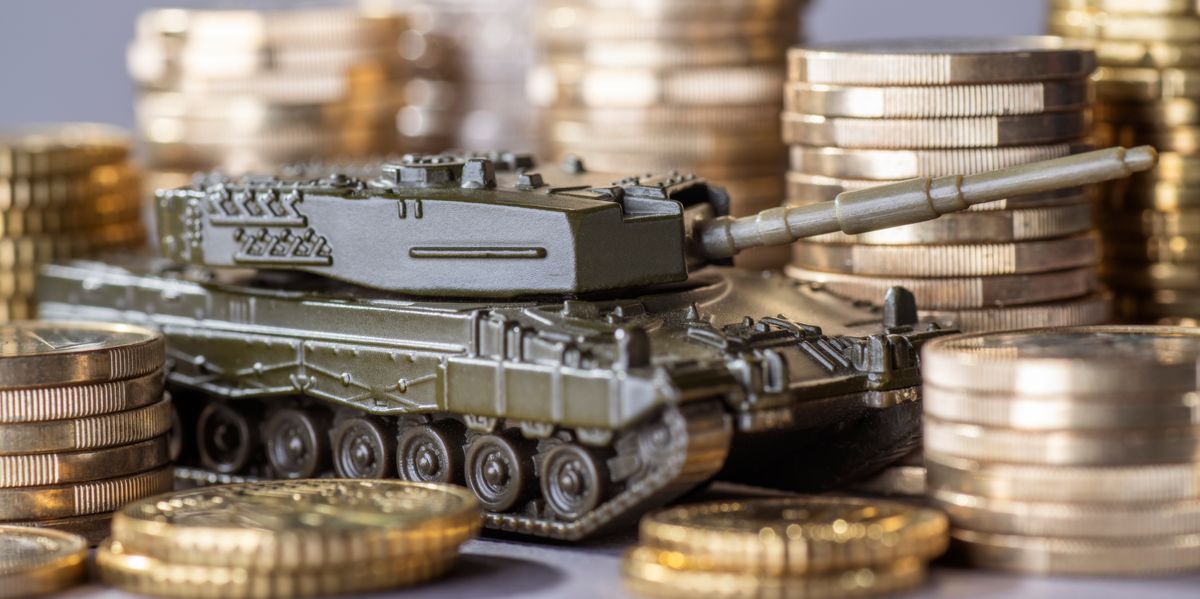Total military spending by nations reached a record high of $2.443 trillion in 2023, according to a new report released Monday by the Stockholm International Peace Research Institute, or SIPRI.
Across the globe, military expenditures increased by 6.8% in real terms over 2022, the steepest rise since 2009, according to the Swedish think tank which has tracked the military spending by countries based on open sources since the 1960s. Every region saw an increase, but Europe, Asia and Oceania, and the Middle East saw the greatest growth..
“The unprecedented rise in military spending is a direct response to the global deterioration in peace and security,” according to Nan Tian, the report’s senior author. “States are prioritizing military strength but they risk an action-reaction spiral in the increasingly volatile geopolitical and security landscape,” he added.
As in the recent past, the United States topped the list of military spenders at $916 billion. It was followed by China with an estimated $296 billion, Russia at an estimated $109 billion, and India at $83.6 billion.
A perennial major arms buyer, Saudi Arabia, at an estimated $75.8 billion, came in fifth, with the United Kingdom ($74.9 billion), Germany ($66.8 billion), Ukraine ($64.8 billion, not including an additional $35 billion in military aid from the U.S. and its NATO partners), and France ($61.3 billion), close behind.
As a percentage of global gross domestic product, or GDP, military spending rose by 2.3% in 2023, and world military spending per person was the highest since 1990, as the Cold War was coming to an end, at $306.
The total of nearly $2.5 trillion was roughly double the amount that the world committed to dealing with climate change which many governments in the Global South, in particular, consider the greatest threat to their security. Global climate-related financing reached a record high in 2021-2022, surpassing $1 trillion for the first time to nearly $1.3 trillion, according to a report issued by the Climate Policy Initiative late last year. The report, however, noted that increases fall far short of what will be needed to avoid the worst impacts of climate change.
Military spending by NATO’s 31 member states, according to the new SIPRI report, accounted for a total of $1.31 trillion dollars, or 55% of global military expenditures. The United States made up more than two-thirds (68%) of NATO’s total military budget, while European NATO members accounted for an additional 28%, the highest percentage in the past decade. Turkey and Canada made up the remaining 4%
A decade after NATO members committed themselves to spending at least 2% of their GDP on their militaries, 11 had met or surpassed that target in 2023, according to the report.
“For European NATO states, the past two years of war in Ukraine have fundamentally changed their security outlook,” according to one of the researchers, Lorenzo Scarazzato. “This shift in threat perception is reflected in growing shares of GDRP being directed toward military spending, with the NATO target of two percent increasingly being seen as a baseline rather than a threshold to reach.”
In 2023, Russian military spending increased by 24%, according to the report, capping a 57% increase since 2014, when Moscow annexed Crimea. The military budget accounted for 5.9% of GDP in 2023, a fraction of the 37% of GDP that Ukraine spent on its military, not including the external aid it received. If that aid is taken into account, the total amount devoted to Ukraine’s military reached around $100 billion, or 91% of Moscow’s military budget.
With an estimated nearly $300 billion military budget, China accounted for half of total military spending across the Asia and Oceania region in 2023, according to the report. That amount marked a 6% increase over 2022 and the 29th successive year of increases in Beijing’s military budget.
The report noted that several of China’s neighbors appear to be linking their own military spending to China’s. The world’s tenth biggest military spender in 2023, Japan increased its budget by 11% to $50.2 billion over 2022. Taiwan increased its military spending to $16.6 billion, also an 11% increase.
As for the Middle East, total military spending in 2023 increased by 9% overall, to $200 billion, the region’s highest annual growth rate of the past decade.
Israel increased its budget by 24% , to $27.5 billion, as a result of the war in Gaza, making it the world’s 15th largest military spender, just ahead of Canada, and well ahead of region’s third biggest spender, Turkey, which also increased its military budget, to nearly $16 billion. Iran’s spending increased only marginally (0.6%) to an estimated $10.3 billion, of which the Islamic Revolutionary Guard Corps was allocated 37%.
Military spending, according to the report, has also increased in the Americas, particularly as in Central America and Mexico whose governments have tried to beef up their security forces against organized crime over the past decade. The report stated that military budgets have grown by about 55% in those countries since 2014.
Brazil increased its military spending last year by 3.1% to nearly $23 billion, as its Congress has submitted a constitutional amendment that would increase the military budget to an annual minimum of 2% of GDP.
- Another year, another delusional Pentagon budget request ›
- SIPRI report: Global military spending increases for eighth year in a row ›
- Global military spending tops $2 trillion for the first time ›
- Global powers boost military budgets by record percent | Responsible Statecraft ›














